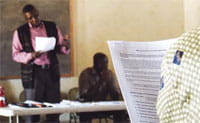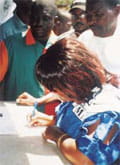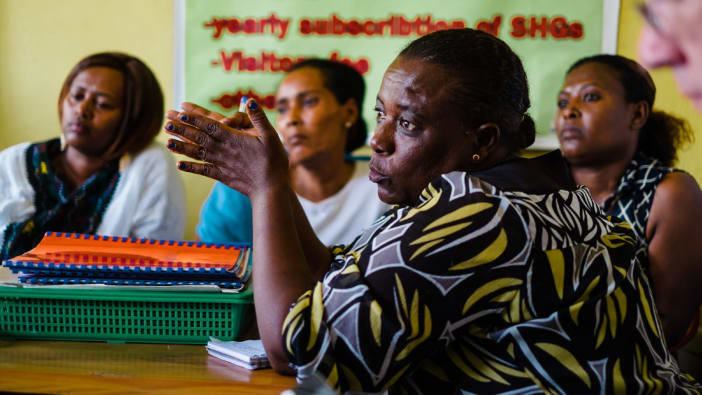Mapalo is an urban community on the outskirts of Ndola in Zambia. It is a community known for its economic poverty. The roads are unpaved, which prevents the movement of goods to market. Many people in the community do not have official titles to the land they live on. Twenty per cent of the people in Mapalo are living with HIV and do not have access to antiretroviral treatment. This article looks at how a group of church leaders turned their passion for community transformation into action by engaging with local politicians.
Since the year 2000, Jubilee Centre has been working with church leaders in Mapalo to equip the local churches to be vehicles of transformation in their community. In 2003, Jubilee Centre brought together the leaders of churches, youth groups, women’s groups and political groups to discuss the ‘Mapalo that we the community want’. They decided that, while they welcomed help from outside the community, they themselves wanted to identify their needs and be the ones leading the development of their community.
Until that time, Mapalo’s experience of political representation had been poor. The community had never seen their Member of Parliament in Mapalo during his five years of office. While the local churches were committed to improving their community, they knew that the support of the community’s political representative was essential. National elections were expected in September 2006, so the pastors saw this as an opportunity to engage politicians in meeting the needs of the community. In the spring they drafted a memorandum of understanding, or social contract, for the politicians to sign. By advocating for the commitment of candidates to meeting the needs of the community, they could gain support from those who were elected for the coming years.
Developing the memorandum of understanding
The pastors started by identifying the needs of their community – including the paving of roads, introducing a secondary school, upgrading the clinic to a hospital, getting piped water and providing a centre that would address issues related to HIV in the community.
The pastors then drafted the memorandum of understanding and organised a meeting for community leaders to provide input. The memorandum was then improved.
As well as seeking commitment and support from the politicians to meeting the stated needs, the memorandum included a commitment from the community. To show their passion for change in their community, it was stated that the community would contribute 25 per cent of the labour and resources necessary for the needs to be met.
Mobilising support
A meeting was held where the memorandum of under standing was presented to the wider community. Copies of the memorandum were printed, with additional pages for people to sign their names in support of it. The community leaders were given copies and sent off to get support from the whole community. Pastors informed their congregations, market leaders informed the market stall holders, and people talked to their neighbours. In total, 3,500 residents signed the memorandum of understanding, showing that they agreed it outlined their needs.
Getting support from politicians
Two leaders represented Mapalo at an open press conference for all the candidates standing for election. The leaders challenged the candidates to sign the memorandum of understanding, and invited them to a community meeting to publicly show their support. The community leaders followed this up by sending a copy of the memorandum and an invitation letter to each candidate.
In September 2006, the electoral candidates, pastors, community leaders and over 1,000 community members attended a community meeting. All the candidates standing to be councillors and three of the candidates standing for parliament went to the meeting. Parts of the memorandum of understanding were read aloud and representative community members stated the size and urgency of the needs.
At the end of the meeting the candidates were given the opportunity to sign the memorandum of understanding. This would be a visible demonstration of their commitment to meet most of the stated needs in the first three years of their term if elected. All the candidates present signed the memorandum, and copies were sent to the district court for public documentation.
News of the meeting spread rapidly and was heard on radios across Zambia. The candidates who had been unable or unwilling to attend the meeting quickly organised a visit to Mapalo in order to sign the memorandum.
Results
After the community meeting and before the elections, the memorandum had an impact within and outside Mapalo:
- A community youth initiative in Mapalo, which had tried to get government funding for the previous three years, received government approval within two weeks of the meeting.
- Some of the key church leaders were personally harassed. They turned down many proposals to attach themselves to political parties, and were interviewed by the police to ensure their political neutrality. Their pure motive for the development of their community withstood all examination and intimidation.
- A community in a neighbouring constituency started to develop its own memorandum of understanding for use in advocacy work after the elections.
- The Electoral Commission of Zambia, which is responsible for education before the elections, showed Mapalo’s memorandum of understanding at over thirty community meetings as an example of engaging with politicians.
After the elections, as the elected councillors and Member of Parliament had signed the memorandum of understanding, the community of Mapalo had a powerful tool to keep the politicians accountable. The community leaders wrote a formal letter to the newly-elected politicians, which was copied to stakeholders in government ministries and opposition parties. The letter congratulated them on their election win and reminded them of their commitment to meeting the needs of Mapalo during their term of political office.
Since the elections in 2006, a number of community needs have been addressed:
- The government has agreed to fund a new middle school. Church and community members have started to clear the land where the school will be built and are ready to contribute labour to the project. The government is planning to upgrade the current basic school to a high school. The community is lobbying the government to do this as soon as the middle school is built.
- The government funded 13 churches to carry out HIV prevention work. Over six months, churches trained peer educators and mobilised youths to spread messages about HIV prevention.
- The Kafubu Water and Sewerage Company has constructed outlets for people to buy safe water, so the proportion of people with access to safe water has increased from 20 to 35 per cent.
- During the rainy season, the only bridge linking the community to the city centre is almost washed away. Each year the community come together to do some repairs. After lobbying the Member of Parliament and local government, some engineers were recently sent to assess the bridge so that sustainable improvements can be made.
- The government has promised to upgrade the community from an illegal settlement to a site and service community. This means that people will soon be holding titles to land where they have built houses.
The community is now united and its elected leaders are accountable to them. Community members know what their needs are and who to communicate with when they cannot solve them through their own efforts.
This article was written by various staff at Jubilee Centre on behalf of the people of Mapalo community.
Jubilee Centre, PO Box 70519, 30 Lualaba Road, Kansenshi, Ndola, Zambia.
Email: [email protected]
Website: www.jubileecentre.org
An outline of the memorandum of understanding
- Who the memorandum is between – community and politicians
- An introduction to the community’s desire to develop
- What the community is calling elected politicians to do
- The contribution of Mapalo community
- The seven stated needs of the community with details of the current situation and the future situation if the need is met
- Space for signatures of community members
- Space for signatures of politicians.











